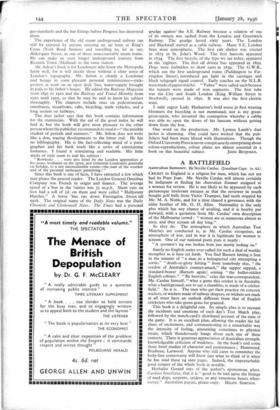A BATTLEFIELD
Australian Summer. By Neville Cardus. (Jonathan Cape. 7s. 6d.)
CRICKET in England is a religion for men, which has not yet had its Pope Joan. Mr. Neville Cardus will almost certainly be indignant at finding his Australian Summer assigned to a woman for review. He is not likely to be appeased by such picturesque irrelevant excuses as that the reviewer in youth bought golf balls from Victor Trumper, had teeth stopped by Mr. M. A. Noble, and for a time shared a governess with the elder brother of Mr. G. 0. Allen. Nationality is the only plea which has any chance of availing, and it is hereby put forward, with a quotation from Mr. Cardus' own description of the Melbourne crowd : " women are as numerous almost as men, and they scream all day long."
So they do. The atmosphere in which Australian Test Matches are conducted is, as Mr. Cardus recognises, an atmosphere of war, and in war it is legitimate for women tc scream. One of our national poets puts it neatly : " A spectator's leg was broken from just merely looking on."
Surely no English series ever called for such a deal of warlike metaphor as is here set forth. You find Barnett hitting a four in the manner of " a man in a beleaguered city attempting a sortie," " death-or-glory hitting " from somebody else, " the cordon of Australia's counter-attack," the sapper sapped, a standard-bearer (Barnett again) seizing " the bullet-ridden English colours." " By heavens," cries the war-correspondent, Mr. -Cardus himself, " what a game this cricket is in Australia, what a battleground, not to say a shambles, is made of a cricket- field." So it is. The men who get their practice on concrete wickets, or wickets made of railway sleepers, or.wickets not made at all must have an outlook different from that of English cricketers who take green grass for granted.
This book is a delightful one. Its simple plan is to recount the incidents and emotions of each day's Test Match play, followed by the match-card's shorthand account of the state of the game. It is an excellent plan, allowing the reader his full share of excitement, and communicating in a remarkable wa) the intensity of feeling, amounting sometimes to physical strain, which thunderously hangs about each one of these contests. There is generous appreciation of Australian strength, knowledgeable criticism of weakness. At the book's end come three brief studies of character and performance ; Hammond, Bradman, Larwood. Anyone who still cares to remember the body-line controversy will know just what to think of it when he has read these 14 sane pages. Indeed, the imperturbable good temper of the whole book is notable.
Herbalist Gerard says of the author's eponymous plant, Carduus benedictus, that it is " good to be laid upon the bitings of mad dogs, serpents, spiders, or any venemous beasts what- soever." Australian papers, please copy. HELEN SIMPSON.


















































 Previous page
Previous page